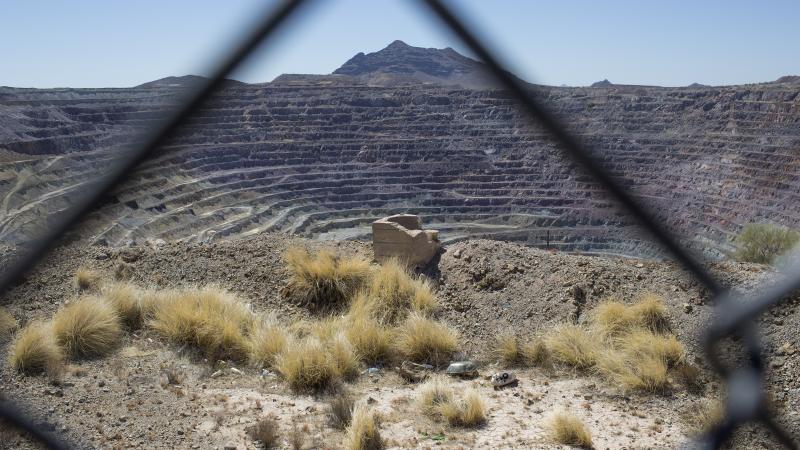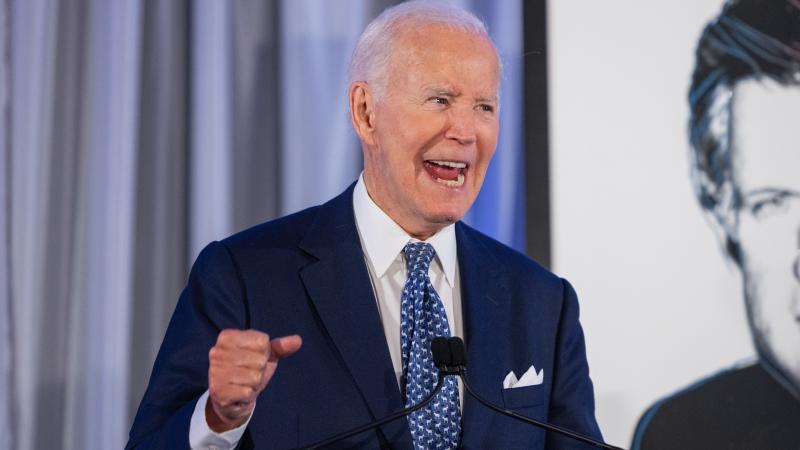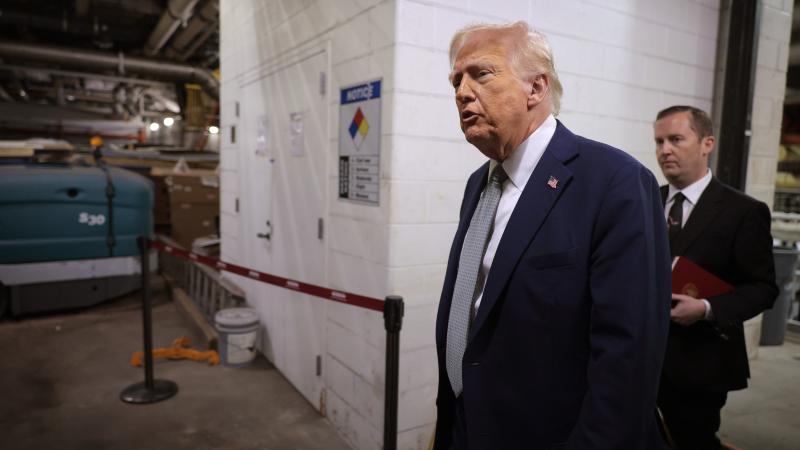Put up, or shut up: Congresswoman challenges anti-fossil fuel Colorado city to go oil free
Boulder, Colorado, with a population of 105,485 in the 2022 census, vows to go 100% renewable in six years, but a Boulder City Council member called Hageman's proposal "ridiculous."
At a recent town hall meeting in Jackson, Wyoming, Rep. Harriet Hageman, R-Wyo., offered a simple proposal. If Boulder, Colorado, truly believes that fossil fuels are so destructive, why not prove that life is better without them by giving them up?
Anti-fossil fuel crusaders and renewable energy proponents have been unsuccessful in producing a demonstration project in which a small town powers its electricity grid entirely on wind, solar and batteries for at least one year. The idea of such a project was first proposed by Francis Menton, who publishes the “Manhattan Contrarian.” If we’re investing trillions of dollars on this energy transition, Menton asks, shouldn’t we prove it will actually work?
Such a demonstration would be a very low bar to reach in terms of net zero visions. Electricity is only about 20% of the total energy the globe consumes, and a town of 20,000 people reaching 100% renewable achieves for 0.0000025% of the Earth’s population what renewable energy proponents want for all 8 billion people on the planet. Despite this low bar, attempts to create such a demonstration have so far failed.
Hageman, who serves on the House Natural Resources Committee, is proposing a similar idea, but instead of powering Boulder’s grid with 100% renewable energy, which the town is already committed to do by 2030, Hageman suggests the flip side of the coin — eliminate fossil fuels.
“My point of pushing for a pilot project is to expose — once and for all — these snake oil salesmen for what they truly are. If we were to actually give up our use of coal, oil, and gas, we would immediately revert to living in third-world, harsh and deplorable conditions,” Hageman told Just the News.
Boulder hostile to fossil fuels
Boulder, a progressive Colorado town of just over 100,000 residents, is known for its hostility to oil and gas. The town filed one of the first climate suits against oil companies in the nation. As with many of these claims, the Boulder lawsuit alleges ExxonMobil and Suncor knew for decades that burning fossil fuels would lead to climate change but concealed this knowledge from consumers. The Colorado Supreme Court on July 29 ordered the Board of County Commissioners of Boulder County, the City of Boulder, and the district court in writing on or before August 26, 2024, as to why the case is properly before the state, rather than federal courts,
Critics of these allegations argue that these claims exploit the massive uncertainties in early climate models to make it appear there was an attempt to deny and deceive the public about the risk. These critics have pointed out this debate was common among scientists looking at the issue at the time.
The lawsuit also accuses companies of violating Colorado's consumer protection laws by creating a public nuisance. The plaintiffs, which include Boulder County and San Miguel County, are seeking compensation for alleged past and future damages, as well as costs to mitigate climate change.
At the August meeting in Jackson, Cowboy State Daily reported, Hageman proposed that if the goal of the climate activist movement is to eliminate fossil fuels, it would behoove those who support the effort to offer up a town as a demonstration that such a goal is feasible and desirable to the alternative.
“If they want to transition 330 million people to a non-fossil fuel future, how about it starts small? How about we start with a pilot project like Boulder, Colorado? Let’s take out all their gas stations, let’s take out all their gas stoves, all their water heaters, all the pavement and return them to dirt roads, right?” Hageman said. Asphalt is made with petroleum.
Wyofile, a left-leaning nonprofit publication in Wyoming, reported that the proposal drew laughter and applause from the audience in Jackson.
The Boulder City Council has considered bans on natural gas hookups in new construction, and it passed aggressive emissions reduction targets. The town plans to reduce emissions by 70% from where they were in 2018, and it plans to reach net-zero by 2035 — nine more years. Part of that goal is moving to 100% renewable electricity by 2030 — six years from now. The town actually plans to be carbon positive — meaning it reduces more emissions than it emits — by 2040.
Despite fervent plans to eliminate all use of fossil fuels in a very short timeframe, Boulder City Councilman Mark Wallach told Wyofile that he’s not behind Hageman’s proposal.
“Nobody on the Boulder Council suggested we can do without all the fossil fuels at this point. We make efforts to do better — to recognize that climate change is real and we do things we can do to combat it,” Wallach said.
How the councilman believes that Hageman’s “ridiculous” proposal will become completely reasonable in six years is unclear. The town’s net zero goals don’t call for Boulder to “do better” and “recognize that climate change is real” as Wallach stated. They call for the elimination of all energy derived from oil, gas and coal by no later than 2040. None of the members of the Boulder City Council or its mayor responded to requests for comment on this story asking if they’d support Hageman’s proposal or how they thought what isn’t possible now would become possible in six years.
Ideal project
Hageman said that the town is ideal for such a demonstration. Its population isn’t too large or too small, she said, and if successful, the replacement energy sources could be scaled up or down. The town has great sunshine and wind resources for renewable energy, she said, and it has varieties of hot and cold weather throughout the year to demonstrate success under many different climate conditions. Likewise, Hageman said, the town is a leader in the anti-fossil fuel movement.
“Boulder has been at the forefront of pushing the so-called ‘renewable’ or ‘green’ agenda while vilifying and attempting to destroy our fossil fuel industries,” Hageman explained.
Hageman said that, while Boulder vilifies fossil fuels, the production of affordable and reliable energy from oil, gas and coal have been a source of prosperity for this country. In the last 100 years, she said, life expectancy has skyrocketed and child mortality has fallen dramatically. Colorado is the fourth-largest oil-producing state and accounts for almost 4% of U.S. total crude oil output, according to the U.S. Energy Information Administration.
“All of this is because of our ability to produce and distribute affordable and reliable energy — meaning primarily our fossil fuels — to the masses. I do not believe that it is unreasonable to demand that we undertake a pilot project proving that we can live, thrive and prosper without the use of these life changing, affordable and abundant resources,” Hageman said.
Hageman said the irony of Boulder’s anti-fossil fuel crusade is that fossil fuels are needed to produce the wind turbines and solar panels that the town believes is going to replace fossil fuels in six years. The same is true for the cement in hydroelectric dams.
“Wind, solar energy, and batteries are terribly inefficient, not only in the mineral resources needed to produce them, but also with regard to wind and solar, they need massive areas of land to operate, thereby displacing other uses such as livestock grazing, crop production (our food source), and wildlife habitat. This is another major flaw in this entire discussion — the failure to take into consideration the opportunity costs and economic impact of the decisions,” Hageman said.
Hageman said that the opposition to her fossil fuel-free demonstration project suggests that even proponents of the energy transition know the costs of such a pursuit.
It’s “clear that anyone with a lick of sense knows that we will not only be using fossil fuels into the long distant future, but that such use and demand will be increasing not decreasing. Our prosperity and standard of living demands that we continue to have access to affordable and reliable energy,” she said.
The Facts Inside Our Reporter's Notebook
- “Manhattan Contrarian"
- only about 20% of the total energy
- such a demonstration have so far failed.
- The town filed one of the first climate suits against oil companies in the nation.
- the Boulder lawsuit alleges
- The Colorado Supreme Court
- debate was common among scientists looking at the issue at the time
- Cowboy State Daily reported
- Asphalt is made with petroleum
- Wyofile, a left-leaning nonprofit publication in Wyoming, reported
- The Boulder City Council has considered bans on natural gas hookups in new construction
- it passed aggressive emissions reduction targets
- life expectancy has skyrocketed and child mortality has fallen dramatically
- according to the U.S. Energy Information Administration
- produce the wind turbines and solar panels














